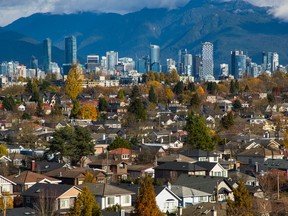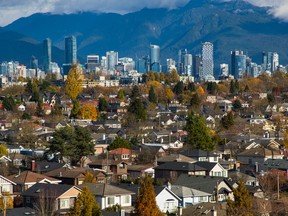The CRA identified $957 million in unpaid income taxes over eight years of audits targeting B.C. real estate, more than five times the amount in Ontario, which has three times B.C.’s population

Article content
After taking a deeper look into B.C.’s real estate sector, Canada’s tax regulator has uncovered $1.3 billion in unpaid tax bills.
The Canada Revenue Agency has dramatically ramped up its auditing of real estate in recent years, scrutinizing both personal transactions and professional activities.
Article content
The agency has found “a disproportionate amount of non-compliance” in Canada’s largest metropolitan centres, with Metro Vancouver “identified as an area that requires our unique attention,” said Jason Charron, director general of the CRA’s compliance programs branch, recently. “We’re continuing to focus on the Lower Mainland, where we know there’s non-compliance.”
Advertisement 2
Article content
Since launching a dedicated real estate task force in 2019, the CRA has mostly focused on Ontario and B.C., increasing the number of audits performed, sending out reassessment notices for billions in additional taxes the agency believes should be paid, and levying hundreds of million dollars in penalties.
In Ontario, the agency assessed $1.4 billion in unpaid taxes and penalties in the real estate sector between 2015 and 2023. B.C., which has about a third of Ontario’s population, had almost the same amount of tax non-compliance identified over the same period: $1.3 billion.
These real estate audits looked at a wide range of activities and entities: property-sellers illegitimately claiming the principal residence exemption, unreported capital gains, people who reside outside of Canada and invest in property here, share transfers and corporate structures designed to mask a property’s beneficial owners, and the activities of homebuilders and realtors.
Although the total value of unpaid taxes and penalties found in B.C. and Ontario was similar, the nature of non-compliance was markedly different in the two provinces. In Ontario, most non-compliance identified by the CRA in real estate was related to unpaid GST and HST on new homes or inappropriately claimed rebates on those taxes. In B.C., most of the non-compliance related to income tax.
Article content
Advertisement 3
Article content
Data provided by the CRA shows that the agency identified $957 million in income tax-related non-compliance in B.C. real estate between 2015 and 2023, more than five times the amount found in the larger province of Ontario, at $178 million, over the same period.
The CRA says confidentiality laws prevent the release of information about the audits, but sent a written statement that said, in general, the income tax-related non-compliance included:
• Situations where a taxpayer acquired an expensive home without a clear reported source of income
• Profits from the quick flipping of homes that aren’t properly reported as taxable business income
• People, including those who aren’t residents of Canada, failing to report capital gains on sales of real estate
• Unreported income earned outside of Canada
• Non-compliance by realtors and developers.
The CRA declined to say how which categories the $957 million broke into — for example, how much was related to property flippers or developers or non-residents — citing the need to protect taxpayer information and maintain “the integrity of our risk assessment system.”
Advertisement 4
Article content
The number of income tax-related audits CRA conducted in B.C. real estate increased by almost 10 times between the 114 audit files opened in the 2015 fiscal year and the 1,089 opened last year.
There has been a corresponding boom in what the agency calls “audit assessments,” meaning the combined value of unpaid taxes still owing and penalties levied. Income tax-related audit assessments related to B.C. real estate averaged $6.4 million annually for the two fiscal years between 2015 and 2017, and shot up to an average of $155.1 million annually over the most recent two-year period, a 2,300 per cent increase.
Canada’s 2019 federal budget included $50 million over five years for the CRA to create a real estate task force, with specialized audit teams. Last month, the 2024 budget boosted that funding to $73 million for the next five years.
This work seems to be “paying for itself and then some,” said Tom Davidoff, an associate professor at the University of B.C.’s Sauder School of Business. The findings show there was “obviously” some kind of problem with tax compliance in this sector, he said, “but what we don’t know is how big of a problem it is now … If there was a problem and they solved it, that would be fantastic.”
Advertisement 5
Article content
For years, many British Columbians were “ringing the bell” about people cheating on their taxes with real estate dealings, said Davidoff, director of UBC’s Centre for Urban Economics and Real Estate. This recent crackdown might not make housing in B.C. significantly more affordable, he said, “but it’s real money and it’s certainly useful to get it back where it belongs.”
Davidoff co-authored a 2022 paper published in The Canadian Tax Journal, which examined the top five per cent of Greater Vancouver homes had a median value of $3.7 million, while the median owner paid income taxes of just $15,800. This was the lowest correlation of property values to income tax contributions of any North American city, the authors wrote, concluding that “most luxury homes in Greater Vancouver appear to be purchased with wealth derived from sources other than earnings taxed in Canada.”
Considering these earlier findings, Davidoff said it makes sense that the CRA’s recent audits of B.C. real estate uncovered income tax “chicanery.”
Representatives of both the Greater Vancouver Realtors and the Canadian Home Builders Association of B.C. said they haven’t heard anything from their members about any recent increases or changes in CRA activity.
Advertisement 6
Article content
Canadians for Tax Fairness, a non-profit tax policy advocacy group, said it welcomes the CRA “doing more to ensure that the real estate sector complies with tax laws, and we encourage the government to adequately fund the CRA so they can do their job.”
In an emailed statement, Canadians for Tax Fairness spokeswoman Erica Shiner said: “Tax avoidance continues to be a problem in many sectors, costing Canadians billions in revenue each year.”
Recommended from Editorial
Bookmark our website and support our journalism: Don’t miss the news you need to know — add VancouverSun.com and TheProvince.com to your bookmarks and sign up for our newsletters here.
You can also support our journalism by becoming a digital subscriber: For just $14 a month, you can get unlimited access to The Vancouver Sun, The Province, National Post and 13 other Canadian news sites. Support us by subscribing today: The Vancouver Sun | The Province.
Article content



![The house at 435 Stewart Rd. on Salt Spring Island as seen through trees from Steward Road. Credit: Google Streetview [PNG Merlin Archive]](https://smartcdn.gprod.postmedia.digital/vancouversun/wp-content/uploads/2024/02/435-stewart-rd-copy.jpg?h=96&strip=all&quality=80&sig=joul5741MKhAK4Kr0ZcsvA)
